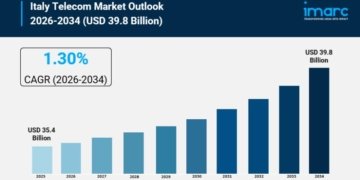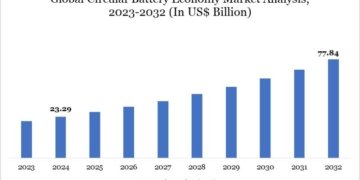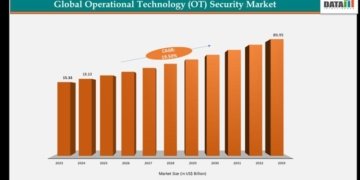Network functions virtualization (NFV) enables the virtualization of network services like routers, firewalls, and load balancers, which were traditionally hosted on proprietary hardware. By running these services as virtual machines (VMs) on standard, commodity hardware, service providers can operate their networks on general-purpose servers rather than specialized ones. NFV not only centralizes network tasks, improving scalability and performance but also simplifies management by consolidating the network environment. Additionally, it enhances security by offering traffic isolation and security services within cloud infrastructures, including customizable firewall protections to ensure secure network access.
Download Sample Report (Get Full Insights in PDF – 298 Pages) at: https://www.alliedmarketresearch.com/request-sample/2837
Decrease in capital and operational expenditure offered by network function virtualization and increase in deployment of virtualized software among enterprise data centers, including internet service providers (ISP) and cloud service providers (CSP) and rapid automation across IT sectors drive the growth of the global network function virtualization market. However, increased network security risks in network function virtualization hamper the market growth. On the other hand, increase in demand for data-intensive applications and the need for cloud-based services present new opportunities in the coming years.
According to the report, the global network function virtualization industry generated $21.90 billion in 2021, and is estimated to reach $180.67 billion by 2031, witnessing a CAGR of 23.8% from 2022 to 2031. The report offers a detailed analysis of changing market trends, top segments, key investment pockets, value chain, regional landscape, and competitive scenario.
For Report Customization: https://www.alliedmarketresearch.com/request-for-customization/2837
The network function virtualization (NFV) market trends in Asia-Pacific are expected to exhibit the highest growth during the forecast period. The region has a robust IT infrastructure and solid software and service offerings, as well as leadership positions in emerging fields including robotics, which would provide lucrative growth opportunities for the network function virtualization market in this region. Furthermore, the technology environment in Asian countries is expanding, particularly in sectors such as healthcare, retail and BFSI. The growing digitalization of business processes would provide lucrative growth opportunities for the market in the Asia-Pacific region.
Based on region, North America contributed to the highest market share in terms of revenue in 2021, accounting for nearly two-fifths of the global network function virtualization industry, and is expected to maintain its dominance in terms of revenue by 2031. The NFV market in North America is aided by the early and fast adoption of technologies, such as cloud computing, software-defined everything (SDx), and IoT. The favorable standards and networking regulations help in boosting the market growth in this region. However, Asia-Pacific is projected to manifest the fastest CAGR of 26.2% during the forecast period. This is because the region has a robust IT infrastructure and solid software and service offerings. In addition, rise in penetration of cloud-based services drive growth of the market in this region.
Based on enterprise size, the large enterprises segment held the highest market share in 2021, contributing to around two-thirds of the global network function virtualization market, and is expected to maintain its dominance during the forecast period. This is because the combination of orchestration, automation, and programmability provided by virtualization enables the IT department of large enterprises to become more agile. However, the SMEs segment is projected to witness the largest CAGR of 25.0% from 2022 to 2031. Surge in need to make business more streamlined, and rise in need to improve efficiency by shortening the time taken to troubleshoot a solution majorly drive the growth of the network function virtualization among small- & medium-sized businesses.
Access the full summary at: https://www.alliedmarketresearch.com/network-function-virtualization-market
Based on components, the hardware segment captured the highest market share in 2021, contributing to nearly half of the global network function virtualization market, and is expected to maintain its leadership status during the forecast period. The virtualization of network functions reduces dependency on dedicated hardware appliances for network operators, and allows for improved scalability and customization across the entire network. Such benefits provide numerous opportunities for the growth of the hardware segment. However, the services segment is projected to witness the largest CAGR of 25.2% from 2022 to 2031. This is because services play a vital role in the NFV market. Services focus on meeting client requirements, including reduced cost and enhanced software performance.
Based on end users, the enterprises segment held the highest market share in 2021, contributing to nearly two-fifths of the global network function virtualization market. Increased focus of enterprises on re-architecting their networking infrastructure to achieve automation, network security, and application performance is one of the major factors leading to significant adoption of network function virtualization technologies among enterprises. However, the data centers segment is projected to witness the largest CAGR of 24.6% from 2022 to 2031. This is because network function virtualization offers data center providers with advanced capabilities such as secured sharing on network, managing large network, efficiency, and flexibility of networking operations.
Covid-19 Scenario
The Covid-19 pandemic led to supply chain disruptions due to limited import and export of devices such as smartphones, computers, and tablets to and from China. China’s manufacturing plants were closed for several months and the NFV industry’s production, sales, and operations were gravely affected. However, some companies are working hard to help the NFV market recover. Moreover, local governments have taken some remedies to mitigate the negative effects of COVID-19. Hence, the NFV industry is expected to come back to its normal phase after 2022 slowly.
Inquiry Before Buying: https://www.alliedmarketresearch.com/purchase-enquiry/2837
Leading Market Players
Cisco Systems, Inc.
Ericsson
Huawei Technologies Co., Ltd.
VMware, Inc.
Nokia Corporation
Hewlett Packard Enterprise Company
DELL EMC
Juniper Networks, Inc.
ZTE Corporation
FUJITSU LIMITED
Comba Telecom Systems
Affirmed Networks
NetScout Systems, Inc.
Wind River Systems, Inc.
ECI Telecom
Mavenir
Ciena Corporation
The report analyzes these key players in the global network function virtualization market. These players have adopted various strategies such as expansion, new product launches, partnerships, and others to increase their market penetration and strengthen their position in the industry. The report helps determine the business performance, operating segments, product portfolio, and developments of every market player.
Buy Now & Get Up to 50% off on This Report: https://www.alliedmarketresearch.com/network-function-virtualization-market/purchase-options
Contact:
David Correa
5933 NE Win Sivers Drive
#205, Portland, OR 97220
United States
Toll-Free: 1-800-792-5285
UK: +44-845-528-1300
Hong Kong: +852-301-84916
India (Pune): +91-20-66346060
Fax: +1-855-550-5975
help@alliedmarketresearch.com
Web: https://www.alliedmarketresearch.com
Follow Us on: LinkedIn Twitter
About Us:
Allied Market Research (AMR) is a full-service market research and business-consulting wing of Allied Analytics LLP, based in Portland, Oregon. AMR provides global enterprises as well as medium and small businesses with unmatched quality of “Market Research Reports” and “Business Intelligence Solutions.” AMR has a targeted view to provide business insights and consulting to assist its clients in making strategic business decisions and achieving sustainable growth in their respective market domains.
AMR launched its user-based online library of reports and company profiles, Avenue. An e-access library is accessible from any device, anywhere, and at any time for entrepreneurs, stakeholders, researchers, and students at universities. With reports on more than 60,000 niche markets with data comprising 600,000 pages along with company profiles on more than 12,000 firms, Avenue offers access to the entire repository of information through subscriptions. A hassle-free solution to clients’ requirements is complemented with analyst support and customization requests.
This release was published on openPR.













